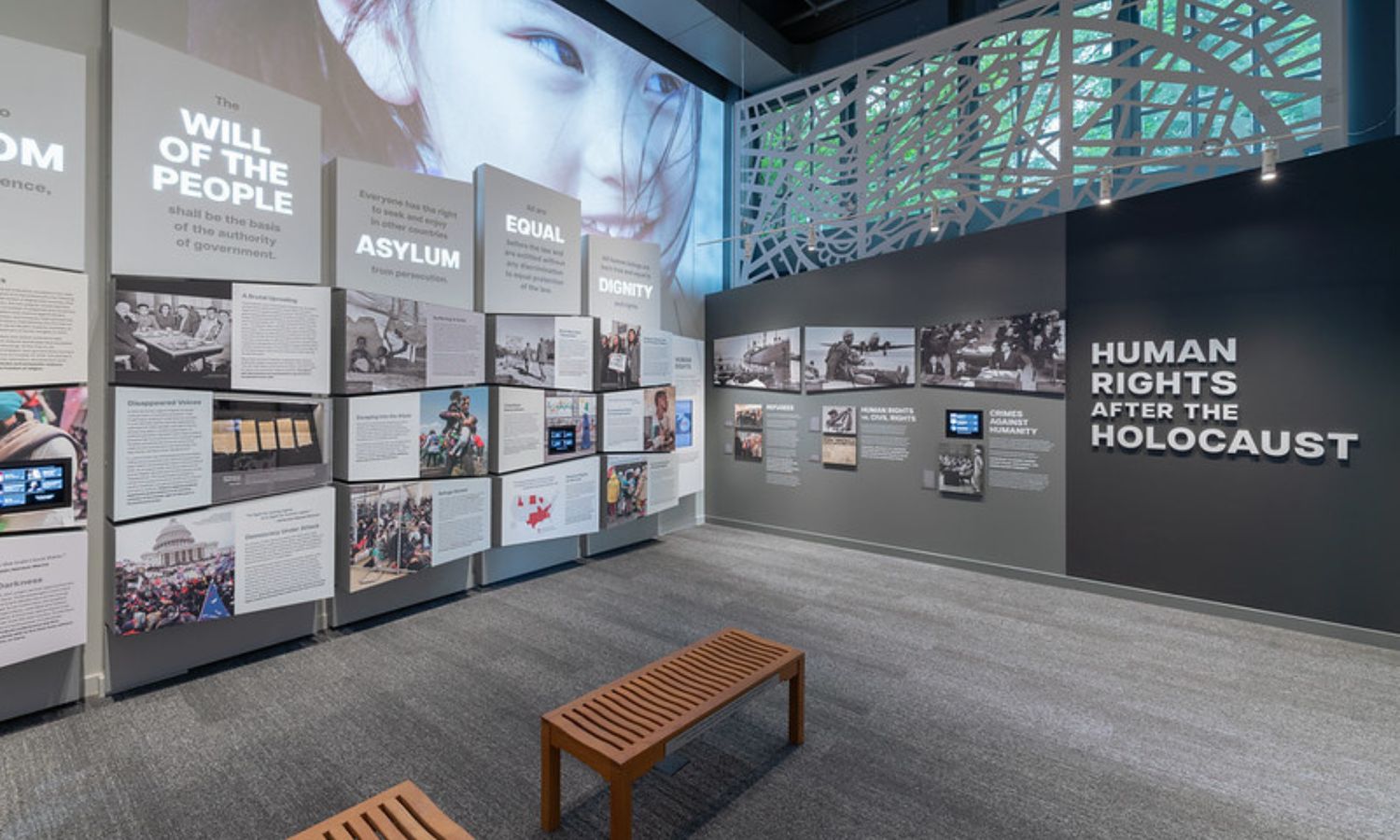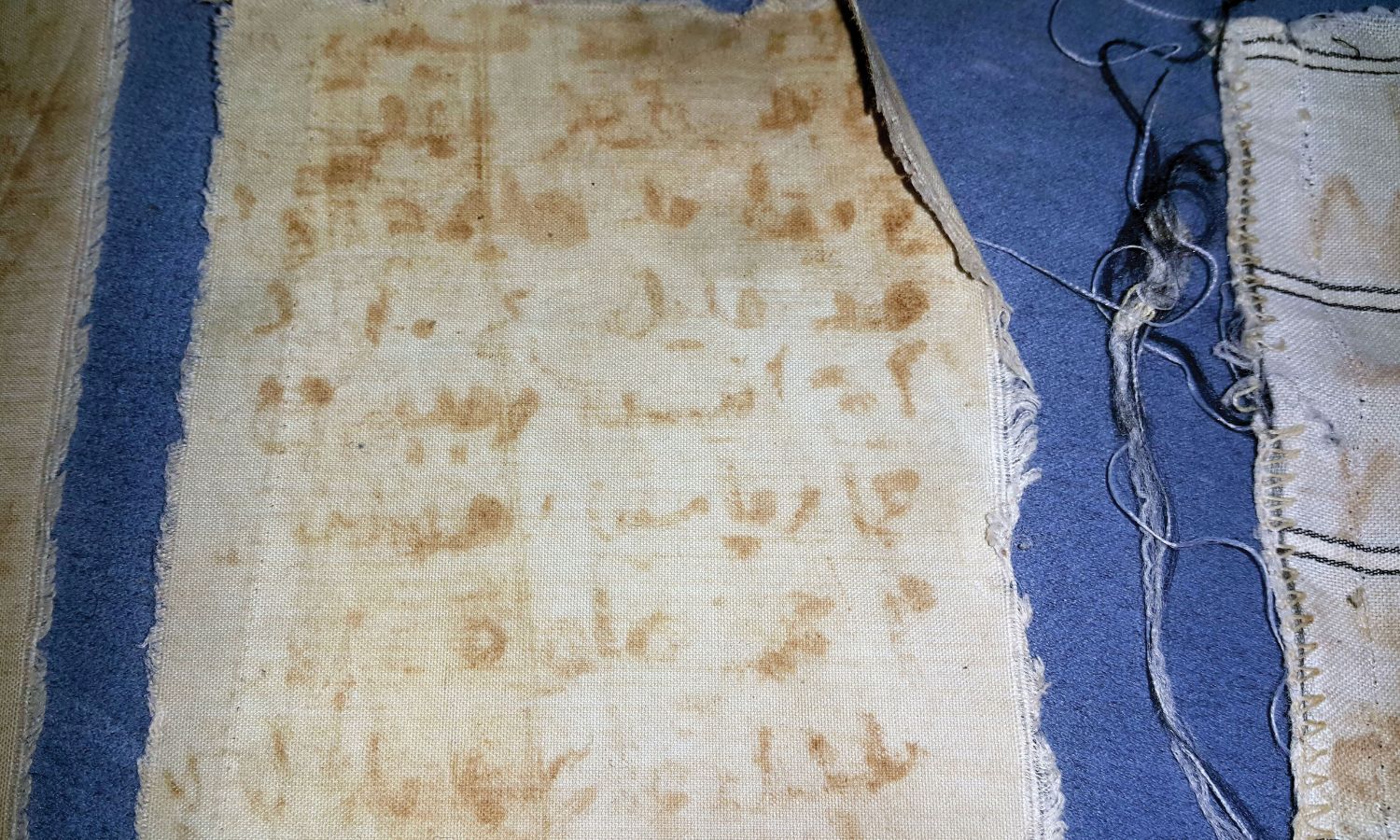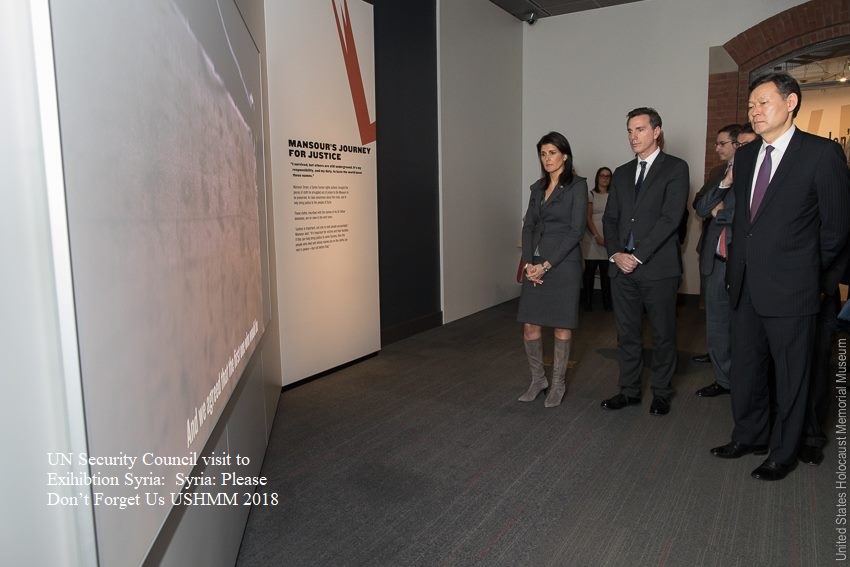



The Oregon Jewish Museum and the Holocaust Education Center in Portland, Oregon is exhibiting strips of cloth bearing the names of Syrians detainees disappeared by the Assad regime.
After a four-month construction shutdown, the Oregon Jewish Museum and Center for Holocaust Education reopens with new shows, a new gallery, Human Rights After the Holocaust, according to Oregon Arts Watch Journal.
The Museum reopened in June after expanding its galleries. The new core exhibition Human Rights After the Holocaust is the centerpiece of the renovated museum. It is first exhibition of its kind in the Pacific Northwest and one of a few nationally that takes on human rights not just through archival photos and first person interviews with recent refugees from Afghanistan, Ukraine, Tigray, Darfur, to name a few, but also through loaned objects from Syria, Rwanda, Bangladesh, Cambodia, and the US. Mansour Omari, a Syrian human rights defender imprisoned in Damascus in 2012, for documenting human rights abuses, loaned OJMCHE an extraordinary item, according to Artdaily newspaper.
Al-Omari was detained along with 14 journalists and human rights defenders by the Air force intelligence of the Assad regime from their offices in the Syrian Center for Media and Freedom of Expression, where al-Omari was responsible for documenting detention and enforced disappearance for the Violations Documentation Center in Syria.
In detention, Al Omari and four detainees used a mixture of blood and rust to write the names of 82 fellow detainees on five strips of ripped cloth. Al-Omari smuggled the list out of prison and contacted the families of the prisoners to tell them that they were alive and where they were being held. Of the 82 prisoners, only four are known to be alive and safe.
The journey of the cloth with the names the detainees in blood and rust continues around world, carrying their souls and stories, and informing the public about the horrors of the ongoing torture and disappearance in Assad’s detention facilities.
From the “Syria: Please Don’t Forget Us” exhibition at the United States Holocaust Memorial Museum in Washington DC for more than two years in 2017, to Sweden at Museum of Mediterranean in Stockholm in 2019, to the Netherlands at the Permanent Peoples’ Tribunal in the Hague, then at the Exhibition A Safer World for the Truth: Setting the Wheels of Justice in Motion in the Hague Atrium in 2022.
Now the cloth pieces will be exhibited in US but in the West Coast this time for at least 2 years.
The five strips of ripped cloth, which al-Omari loaned to the museum is and illustration and irrefutable evidence of the horrors that Syrian detainees are subjected to in the prisons of the Syrian regime, al-Omari said to Enab Baladi.
Al-Omari and four of his fellow detainees wrote the names of the detainees with rust and blood using chicken bones, where there was no other way to write them. Then he smuggled them from an underground prison. The human rights defender then contacted the families of the detainees whose names were written on the cloth to inform them of the whereabouts of their loved ones and that they were alive.

Five strips of ripped cloth with the names list which Mansour al-Omari smuggled out of prison and contacted the families of the detainees whose names were written on the cloth to inform them of the whereabouts of their loved ones and that they were alive. © Enab Baladi/ Mansour al-Omari.
“Museums and galleries are spaces for dialogue. They provide a platform for dialogue among members of the public with all their diversity and allow them to participate actively and directly,” said al-Omari. He added, “Museums also play an exceptional role by raising contemporary issues, educating visitors and informing them about human rights violations and mass atrocities, using their creative tools, including videos, photos, music, live testimonies and evidence of crimes, which contributes to shaping public opinion and strengthen it regarding the facts.”
Judy Margles, director of the Jewish Museum of Oregon and the Holocaust Education Center said that “The exhibition opened a few days ago and it’s been amazing to watch visitors reading, listening, absorbing, looking at the shirt pieces and asking questions. And sometimes shedding tears.” She added that “the shirt pieces are the star of the exhibition”.
Scott Miller, who is curating the exhibit on contemporary atrocities in the Museum described “how powerful the display of the fabric pieces are in the museum in Portland”, he added that they are making a strong impression and educating the museum’s many visitors on the plight of Syrian victims of torture and forced disappearance. The fabric pieces and the names are the most important artifact and piece of evidence.”
The Syrian Network for Human Rights (SNHR) was able to document 155243 people who are still detained or disappeared since 2011, 135481 of which are detained by the Syrian regime.
Al-Omari told Enab Baladi that the exhibition is an opportunity to shed light on the issue of detainees and torture in Syria and contributes to presenting facts to different segments of society, including school and university students, academics, the media, politicians, and decision makers.
He added that the exhibition shows the horrors which the detainees and Syrians, in general are suffering and which force them to flee the country and seek safety in other countries as refugees.
Displaying evidence of Bashar al-Assad’s crimes against Syrians, for the public prevent these crimes from being forgotten or neglected and impedes the Assad regime’s image as the perpetrator of the most horrific crimes in this century form fading.
The exhibit of the ripped cloth comes at a sensitive time following the recent Arab normalization of relation with the Syrian regime, which complicates the efforts of the detainees’ families who are striving to know the whereabouts of their loved ones.
In addition to exhibiting the cloth, al-Omari’s video testimony about torture in Assad’s prisons, and the story of the strips of ripped cloth and the conditions of the detainees, will be displayed at the Museum.
In 2017, the United States Holocaust Memorial Museum in Washington DC loaned the cloth from al-Omari and worked with al-Omari to open a special exhibit “Syria, Please Don’t Forget Us”. Using video, music, and testimony, Syria: Please Don’t Forget Us introduced visitors to the conflict in Syria through one man’s story. The museum also displayed a mobile phone and a “USB” device used by the Syrian military police photographer, known as “Caesar,” who leaked thousands of photos of victims how were tortured and killed by the Assad regime.
Hundreds of thousands of Americans, and others visited the Exhibit, including by the current US presidential candidate, Nikki Haley, who was the United States ambassador to the United Nations at the time she visited the Exihibt.
Nikki Haley along with all members of the United Nations Security Council visited the exhibition. Later Haley addressed the Security Council:
It’s a true tragedy that Russia has sent us back to square one in the effort to end chemical weapons use in Syria. But we will not cease in our efforts to know the truth of the Assad regime and ensure that that truth is known and acted on by the international community.
That is why we hosted all 15 members of this Council at the U.S. Holocaust Museum last week. The exhibit was called: “Syria: Please Don’t Forget Us.” All of us saw undeniable evidence of the Assad regime’s atrocities and
human rights violations. We cannot and should not forget the Syrian people. The United States will not forget them.
Before his release from prison in 2012, the detainees gathered around al-Omari to bid him farewell while saying to him, “Please do not forget us.” This phrase became the title of that exhibition at the U.S. Holocaust Museum.

Nikki Haley, former United States ambassador to the United Nations, visits the exhibition “Syria, Please Don’t Forget Us” at the Holocaust Museum ©The US Holocaust Museum/2018.
On June 29, the United Nations General Assembly voted in favor of a draft resolution establishing an international institution to clarify the fate of missing persons in Syria.
According to the resolution, the Assembly agreed to establish a new international institution to clarify the fate of the missing and their whereabouts in Syria and to provide adequate support to the victims, survivors, and families of the missing.
The draft resolution was supported by 83 countries, while 11 countries voted against it, and 62 countries abstained from voting.
Among the Arab countries, Qatar and Kuwait voted in favor of the project, while Saudi Arabia, the UAE, Bahrain, Oman, Egypt, Jordan, Morocco, Lebanon, Tunisia, and Yemen abstained.
The draft resolution was co-authored by Luxembourg, Albania, Belgium, Cape Verde, the Dominican Republic, and Macedonia.
if you think the article contain wrong information or you have additional details Send Correction